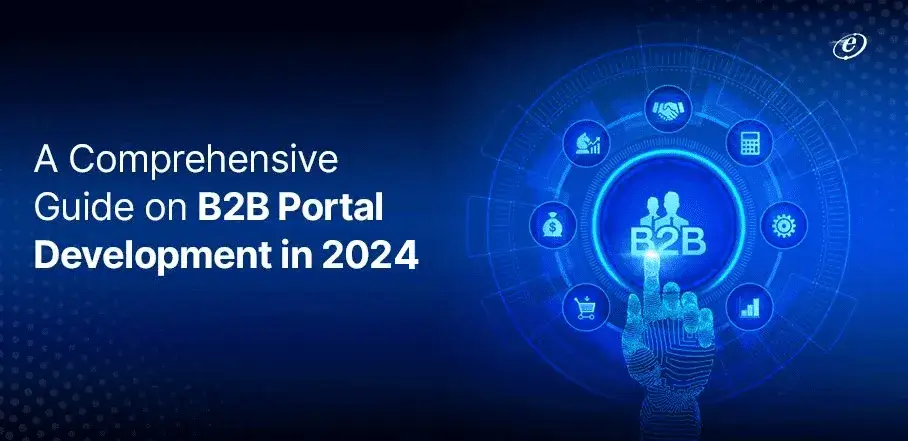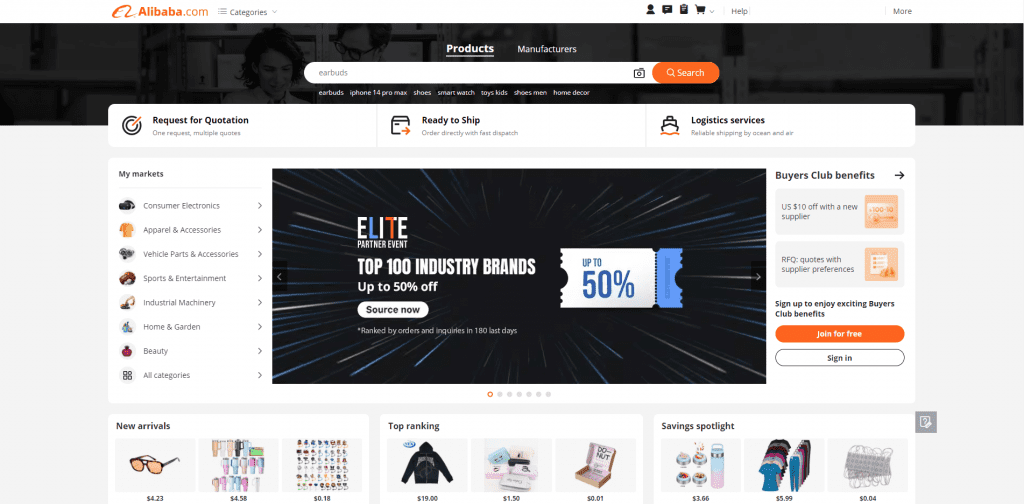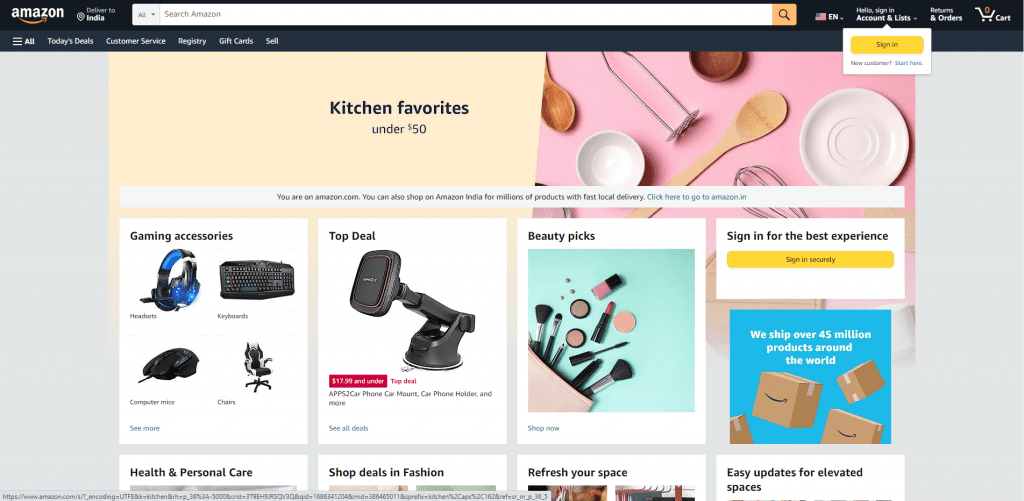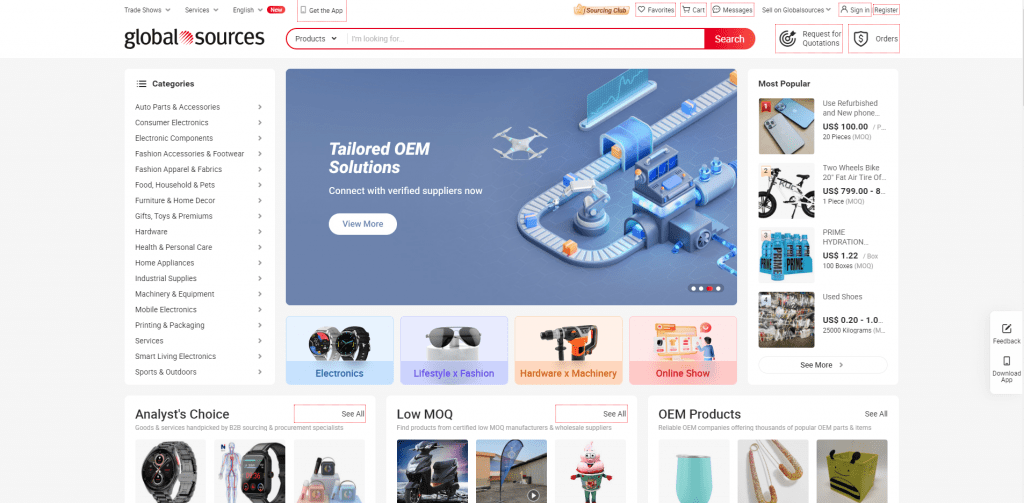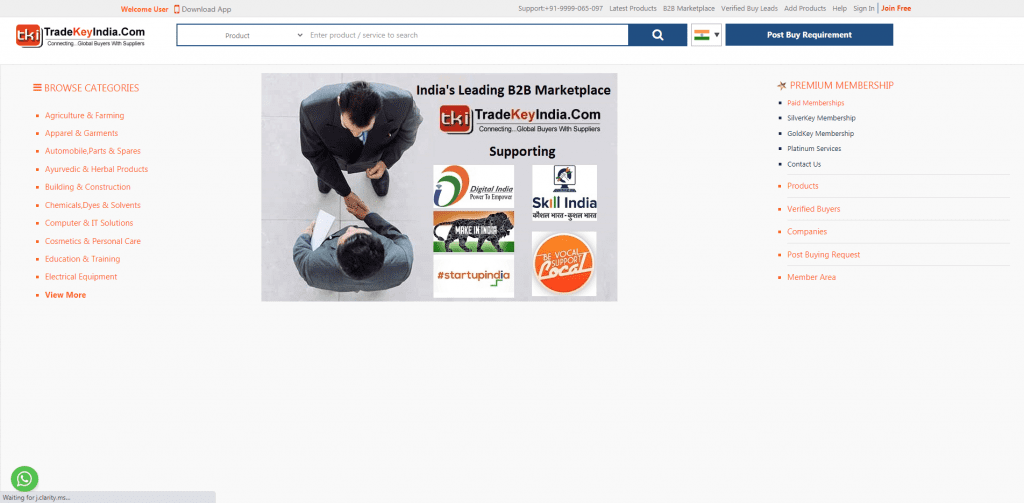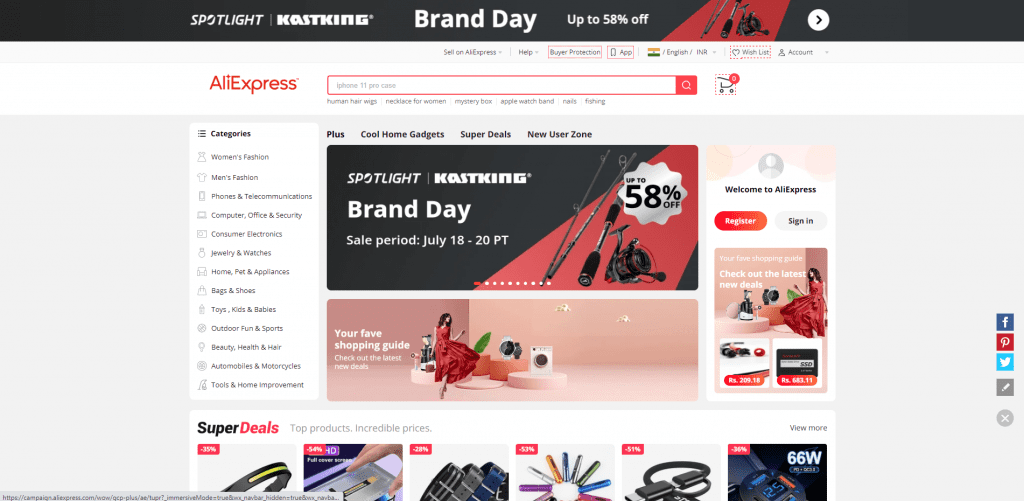Synopsis: A web portal is a specialized website that serves as a gateway to various resources, services, and information. Portals often provide personalized content and tools for specific audiences or purposes, while websites generally offer information about a particular entity or topic. This detailed B2B portal development guide will help you understand how portal development helps grow your industry (Finance, Healthcare, Education, Manufacturing, Logistic, etc.) in this competitive landscape.
According to Gartner research, 80% of all B2B sales will occur online by 2025. Entrepreneurs are motivated to create B2B web portals and build a digital space for firms to conduct business with other businesses as the general trend toward digitalization.
Businesses can streamline their processes and transactions by developing web portals with the help of a B2B portal development company. These portals let companies manage their inventory, orders, customer information, and more.
Do you know in 2022, 65% of B2B enterprises wanted to sell online, as per research by McKinsey & Company? Manufacturers now consider the collective aspects of their business growth to keep connected with the customers’ needs, given the limitless chances that the B2B eCommerce site offers.
Custom B2B portals can assist businesses of any size and sector in streamlining a variety of B2B scenarios to stay competitive and accomplish their goals.
For example :
- Manufacturing sector- By giving you real-time visibility into inventory and stock levels, production schedules, and logistics, portal software can help you manage complicated supply chains more successfully.
- Wholesale Sector- B2B portal software can be used in the wholesale sector to handle supplier relationships and product catalogs.
- ECommerce- B2B eCommerce portals can be used by retailers to manage vendor relationships, purchase orders, delivery schedules, and consumer refunds.
- Travel- B2B travel portals let users plan their trip and prebook all tickets within the pre-decide budget.
So, what do you think? Want to take your business to its deserving heights with robust portal development?
In this comprehensive guide to B2B portals, we will understand b2b portals, their features, benefits, and how to achieve successful b2b web portal development and cost estimation.
We will also discuss implementation challenges and best practices and what to look for when selecting a B2B portal development company to work with.
Let’s Go Over an Overview of B2B Portals
A business-to-business portal, commonly referred to as a B2B portal, is an online platform that makes it easier for businesses to access information and documents, goods, and services. Organizations frequently utilize B2B portals to interact and conduct business with suppliers, distributors, trading partners, and others.
B2B web portals are one-stop online shops where customers, suppliers, or partners can quickly access your products, services, and content and conduct business. Depending on your objectives, you can utilize it as a marketplace, sales engine, or collaborative tool.
Read the distinctions between websites and web portals.
Modern B2B buyers expect to be able to conduct their own research and transactions, just like B2C customers do. B2B portal development services give workers 24/7 access to web tools that let them do all of that and much more.
Save time and choose specialized web portal development services. Build B2B portals that generate high ROI and enhance your reputation.
Top 5 Examples of B2B Portals
1. Alibaba
2. Amazon
3. Global Sources
4. TradeKey
5. AliExpress
Types of B2B Portals
There are various types of B2B portals, each catering to specific industries or business needs.
| Types of Portals | Overview |
| Marketplace Portals |
|
| Financial Portals |
|
| Collaboration Portals |
|
| Procurement Portals |
|
| Knowledge-sharing portals |
|
| Industry-specific Portals |
|
| Supplier Portals |
|
| Partner Portals |
|
7 Essential Features to Consider in B2B Web Portal Development
When developing a B2B portal, several essential features must be considered to ensure its effectiveness and usability. By taking into account these essential features during B2B web portal development, you can create a comprehensive and user-friendly platform that meets the specific needs of businesses and enhances their overall experience and productivity.
1. Customizable Dashboard
Provide users with customizable dashboards containing relevant data, critical metrics, and widgets so they can set up their own preferred view and quickly access crucial information. Sales, profitability, and order status data are among the performance metrics that businesses can track on the dashboard.
2. Secure Payment Processing
Incorporate secure payment gateways to enable seamless and safe online transactions between businesses, ensuring compliance with payment security standards.
3. Streamlined Navigation
Making sure that customers can find what they are looking for easily is crucial. Therefore, your portal development services provider incorporates a simple navigation system that lets users quickly get the necessary information. A well-organized menu with distinct names and categories may make the navigating procedure simpler.
Want dedicated developers who can develop all the trending features for your business? Then, explore our services to hire such programmers.
4. Order Management System
Enable businesses to place, track, and manage orders seamlessly within the portal. Include features such as order history, status updates, notifications, and the ability to manage returns or cancellations.
5. Search Functionality
Implement a powerful search feature that enables users to easily find products, orders, or other relevant information within the portal, saving time and improving usability. A search bar is recommended to be easily visible on the B2B portal’s homepage and other pages.
6. Reporting & Analytics
Ensure your B2B portal development company must include robust reporting and analytics features to track and analyze essential business metrics, order history, sales performance, customer behavior, and other relevant data for informed decision-making.
7. Mobile Responsiveness
B2B portals must be mobile-responsive as more people use the internet using mobile devices. The portal must be adaptable and optimized for different devices, including smartphones and tablets, to enable users to access and use the portal while on the go. This will ensure a seamless experience on mobile or other devices.
Top 10 Web Portal Development Trends to Watch Out in 2023
Key Benefits of B2B Web Portal Development
B2B portals revolutionize the way businesses engage with each other by streamlining transactions and improving collaboration. They enable businesses to expand their reach, optimize operations, reduce costs, and deliver superior customer experiences, ultimately driving growth and competitiveness in the B2B ecosystem.
Custom B2B web portal development offers numerous benefits for businesses engaged in the business-to-business ecosystem. Let’s cover some major ones.
-
Improved Customer Experience
B2B portal developers create a convenient and user-friendly interface for businesses to interact with suppliers and customers. Features such as personalized catalogs, order history, and quick reordering options enhance the customer experience and build stronger relationships.
-
Increased Efficiency
Web portals automate various processes, such as order management, inventory tracking, and invoicing. This automation saves time and reduces manual efforts, allowing businesses to allocate resources more effectively and focus on core activities.
-
Expanded Market Reach
B2B portals connect businesses with a wider network of potential partners, suppliers, and customers. They provide a platform to showcase products or services to a larger audience, increasing market exposure and opening new business opportunities.
-
Reduced Operating Cost
B2B portals can lead to significant cost savings for businesses. Businesses can lower operational costs by automating manual processes, reducing paperwork, and eliminating intermediaries.
-
Enables Personalized Content
Custom B2B portals offer personalized experiences tailored to individual businesses. They allow users to customize their preferences, access relevant information, and receive personalized recommendations, improving engagement and satisfaction.
-
Streamlined Transactions
B2B web portal development simplifies and streamlines the buying and selling process between businesses. They provide a centralized platform where businesses can place orders, track shipments, manage invoices, and handle payments efficiently. This leads to faster and more accurate transactions, reducing manual errors and administrative overhead.
-
Reduced Time to Sale
Web portals provide your customers with self-service web resources like web demos and catalogs, A-to-Z order management systems, dashboards, etc., to hasten and streamline purchasing. Therefore, you may shorten your sales cycle and close more deals in less time with B2B web portal development.
-
Improved Collaboration & Communication
B2B portals offer collaboration tools such as messaging, shared workspaces, and discussion forums. These features facilitate seamless communication and collaboration between businesses, suppliers, and partners, enabling faster decision-making, problem-solving, and information exchange.
After reading these advantages, don’t you think B2B web portal development is the best way to help your company reach its peak? If you are with me, you must read the steps for building B2B web portals below.
Looking to team-up with a group of developers who collaborate with global businesses proficiently? Then, choose our dedicated team today!
Step-By-Step Processes for B2B Portal Development
A unique B2B portal must be carefully planned, designed, and developed. A leading B2B portal development company follows the steps below to create a user-friendly, highly functional, and robust web portal that fits a business’s needs. Here’s a step-by-step guide to help you get started:
1. Define Your Goals
Identify your objectives and what you want to achieve with your B2B portal. Understand the specific needs of your target audience, such as suppliers, distributors, or partners.
2. Conduct Market Analysis
Research the existing B2B portals in your industry to gain insights into their features, functionalities, and user experiences. Identify any gaps or opportunities that you can leverage in your custom portal.
3. Identify Key Features
Determine the essential features and functionalities your B2B portal should have. For example, some common features of eCommerce portal are product catalogs, inventory management, order processing, invoicing, secure user authentication, role-based access control, integration with existing systems (ERP, CRM), and analytics/reporting.
4. Plan User Experience
Create wireframes or mockups to visualize the user interface, and user flows. Focus on intuitive navigation, efficient workflows, and a user-friendly interface that caters to your target audience’s needs.
5. Choose Right Technology
Select appropriate technologies and frameworks for your B2B web portal development. Consider factors such as scalability, security, integration capabilities, and your development team’s expertise. Common choices include web development frameworks (such as Ruby on Rails, Django, or ASP.NET), content management systems (CMS) like WordPress, and cloud platforms like AWS or Azure.
Read our guide on choosing the right web portal development framework.
6. Develop Portal
Start the development process by creating the underlying infrastructure, database schema, and server-side logic. Implement the planned features, ensuring data security and performance optimization. Consider leveraging existing frameworks or open-source solutions to expedite development.
7. Design Front End
Develop the user interface (UI) using top front end frameworks. Focus on responsive design to ensure the portal works well across different devices and browsers. Incorporate visual elements that align with your brand identity.
Learn how the leading front end development company develops robust User interfaces.
8. Integrate with Backend
Integrate the portal with any existing backend systems or databases, such as ERP or CRM systems, to streamline data exchange and improve operational efficiency. Implement secure APIs or data connectors for seamless integration.
9. Implement Security Measures
Throughout B2B portal development, implement robust security measures to protect sensitive data and ensure secure user access. Use encryption, SSL certificates, secure authentication mechanisms, and role-based access control (RBAC) to protect user accounts and confidential information.
10. Test & Refine
Conduct thorough testing of your B2B portal to identify and fix bugs, usability issues, or performance bottlenecks. Perform functional, compatibility, and security testing to ensure a high-quality user experience.
11. Deployment & Launch
Once testing is complete, deploy your B2B portal to a production environment: Configure web servers, domain names, and necessary infrastructure. Communicate the launch to your target audience, providing training or support as needed.
11. Maintenance & Improvement
Regularly monitor your portal’s performance, collect user feedback, and address any issues or feature requests. You must plan for ongoing maintenance, updates, and improvements to keep your B2B portal secure and up to date.
Note* Remember, developing a custom B2B portal can be a complex and time-consuming process. Therefore, consider involving an experienced B2B portal development services provider to ensure a successful outcome.
How to Choose the Right B2B Portal Development Company?
Choosing the right B2B web portal development company is crucial for the success of your project. Here are some factors to consider when making your decision:
1. Industry Experience & Expertise
B2B portal development service providers’ experience and expertise should align with your project needs.
- Look for a company with a proven track record in developing B2B portals.
- Check their portfolio and client testimonials to assess their experience in building similar solutions.
- Check that the company is on the list of top-rated Clutch dedicated developers.
2. Technology Competence
Ensure they can leverage the right tools and technology stack to build a robust and scalable portal.
- Evaluate the company’s proficiency in the technologies required for your B2B web portal development.
- They should have expertise in major programming languages, frameworks, databases, cloud platforms, and security protocols.
3. Security and Compliance
B2B portals deal with sensitive data and require stringent security measures.
- Ensure the custom portal development company has a solid understanding of security best practices and compliance standards relevant to your industry, such as GDPR or HIPAA.
- Inquire about their approach to data protection, encryption, access controls, and security testing.
4. Integration Capabilities
B2B portals often need to integrate with existing systems like ERPs, CRMs, or payment gateways.
- Assess the development company’s experience and expertise in integrating different systems and third-party APIs.
- They should have a good understanding of data synchronization, API design, and middleware technologies.
5. Project Management Approach
Effective project management ensures timely delivery, transparent communication, and efficient collaboration.
- Understand the company’s project management methodology and communication processes.
- Look for companies that follow agile methodologies, provide regular progress updates, and involve you in the development process.
6. Cost and Budget
While cost is an important factor, remember to prioritize quality, expertise, and long-term value over the lowest price.
- Consider the development company’s pricing structure and how it aligns with your budget.
- Assess the company’s ability to provide a detailed cost estimate and transparent pricing model.
7. On Going Support
B2B portals require ongoing support and maintenance.
- Inquire about the company’s post-development support services, such as bug fixing, updates, and troubleshooting.
- Understand their service-level agreements (SLAs) and response times to ensure they can provide timely support when needed.
Note *Remember to conduct thorough research, ask relevant questions, and assess multiple development companies before making a final decision. A well-chosen development partner can contribute significantly to the success of your B2B portal project.
Save time finding the best portal development company. Find out why we can be the best pick and start a fruitful collaboration.
Find the Cost of B2B Portal Development
The average cost of custom B2B web portal development is $ 30,000-$60,000. This cost is not fixed and can vary widely based on several factors, including the project’s complexity, the desired features and functionalities, the technology stack used, the level of customization, and the location and experience of the development team.
It’s important to note that providing an exact cost requires understanding the specific requirements and scope of your B2B portal. It is recommended to consult with web development agencies and request project proposals to receive accurate cost estimates based on your unique needs.
Generally, a leading B2B portal development company charges from tens of thousands for a basic portal to hundreds of thousands or even millions of dollars for large, complex portals with extensive features and integrations.
Careful planning, precise project requirements, and effective communication with the development team will help manage costs and ensure a successful development process.
Here is the cost estimation based on the type of development team you select
| Team Type | Development |
| Local Agency | $50,000 |
| In-House | $60,000 |
| Outsource Agency | $40,000 |
| Freelancers | $35,000 |
If you are looking for an outsourcing option, the cost to hire dedicated developers varies from region to region.
| Region | Cost Per Hour |
| USA | $100-$120 |
| Australia | $90-$120 |
| UK | $80-$100 |
| Western Europe | $60-$100 |
| India | &25-$50 |
| Ukraine | $40-$80 |
At eLuminous Technologies we provide developers at a minimum price of $25+ per hour (based on experience).
Note* Whether you hire an internal web development team or contract with a third party will affect the project’s overall cost, among other factors. For instance, the price of B2B web portal development would start at about $80k based on the typical hourly rates of UX/UI designers, frontend, backend, and QA engineers in the US.
Without sacrificing the quality of the finished product, outsourcing to a reputable B2B web portal development service provider could reduce the cost of developing a web portal by up to 30%.
Common Challenges of B2B Portal Development and Tips to Overcome Them
B2B web portal development can present various challenges throughout the process. By anticipating and addressing these common challenges during B2B web portal development, you can enhance the success and adoption of your portal, ensuring that it effectively meets the needs of your business and users.
Here are some common challenges and possible solutions to address them:
-
Complex Integration Requirements
Challenge: B2B portals often need to integrate with multiple existing systems, such as ERPs, CRMs, or inventory management systems. This integration can be complex due to differences in data formats, protocols, or APIs.
Solution: To overcome this challenge, plan and prioritize integration requirements early in development. Use standardized protocols (such as REST or SOAP) and consider using middleware or integration platforms to simplify data exchange and ensure system compatibility.
-
Security and Data Privacy
Challenges: B2B portals deal with sensitive business data, including customer information, financial data, and confidential documents. Ensuring data security and privacy is crucial.
Solution: Implement robust security measures, including secure authentication, data encryption, role-based access control, and regular security audits. Adhere to industry best practices and pertinent data protection laws like HIPAA or GDPR.
-
Scalability and Performance
Challenge: B2B portals need to handle large data junk and support many concurrent users. Performance and scalability challenges can arise when the portal experiences increased usage or data volume.
Solution: Design and optimize the portal’s architecture to handle scalability by utilizing techniques such as load balancing, caching, database optimization, and efficient code. Regularly monitor performance metrics, conduct stress testing, and optimize system components as needed.
-
User Adoption and Training
Challenge: B2B portals often introduce new workflows and processes for users. Some users may face challenges in adopting the portal, leading to resistance or low usage.
Solution: Provide comprehensive user training and documentation to educate users about the portal’s features and benefits. Consider conducting workshops, webinars, or on-site training sessions to familiarize users with the portal’s functionality and address any concerns or questions they may have.
No need to worry about training and integration activities. Our post-launch support covers all relevant facets. So, team up today!
-
Change Management and Stakeholder Buy-In
Challenge: Implementing a B2B portal often requires organizational change, including new processes and working methods. Resistance to change and lack of stakeholder buy-in can hinder the successful adoption of the portal.
Solution: Develop a comprehensive change management strategy that includes effective communication, stakeholder engagement, clear benefits, and ROI messaging. Involve key stakeholders early in the development process, address their concerns, and ensure their involvement and support throughout the project.
-
Maintenance and Support
Challenge: B2B portals require ongoing maintenance, updates, and support to address issues, implement new features, and ensure the portal remains secure and current.
Solution: Establish a support and maintenance plan with the development team or an external service provider. Include regular bug fixing, security patching, and version updates. Moreover, provide multiple channels for users to report issues and offer timely support to address their concerns.
End Note
With continuous technological advancements, investing in web portal development is essential for businesses looking to stay competitive, increase operational efficiency, and foster long-term growth in today’s digital era.
B2B web portal development is crucial to modern business operations, facilitating efficient communication, collaboration, and business transactions. By creating a centralized platform, B2B portals streamline processes, reduce manual errors, enhance transparency, and improve overall productivity.
Are you seeking a trustworthy tech partner with experience creating B2B portals?
We can help you!
Since 2002, the eLuminous team have been creating value-driven solutions for B2B brands. You can customize your project with us as per your growing business needs.
Frequently Asked Questions
-
I have a website, but do I still need to design a B2B web portal for my business growth?
Yes, designing a B2B web portal for your business can significantly contribute to your growth. A website is like the face of your business, conveying your product and services to potential customers. While a portal is a dedicated platform for streamlined communication and collaboration expanding your reach and fostering long-term partnerships, ultimately driving your business growth.
-
How does a portal development company assure the security of my portal data?
A custom portal development company ensures the security of your portal data through various measures. For example, at eLuminous Technologies, we employ robust encryption techniques, implement strict access controls, conduct regular security audits, and adhere to industry best practices.
-
Should I develop a separate portal for my employees and customers?
Yes, developing separate portals for employees and customers can offer numerous benefits. It allows for tailored experiences, specific functionalities, and optimized workflows for each group. It enhances efficiency, improves user experience, and ensures that sensitive information is securely accessible only to the intended audience, promoting better collaboration and customer satisfaction.
Team Leader
4+ years of experience writing Informative Articles and Blogs, Press Releases, Tech News, and White papers. She is the voice of eLuminous, updating clients about new ventures, services, and achievements while keeping them up-to-date with the latest market trends and technological advancements. She believes in conveying the “Right words to the Right Audience at the Right Time.”
